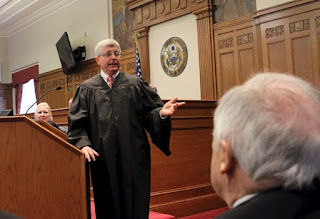In the case of Thomas v. Orozco-Pineda, No. 3:24-CV-00288-MEM (M.D. Pa. Nov. 8, 2024 Mannion, J.), Judge Malachy E. Mannion of the Federal Middle District Court of Pennsylvania addressed a Motion to Dismiss in which a trucking company Defendant asserted that a Plaintiff-spouse’s loss of consortium claim, presented in an Amended Complaint, was barred by the statute of limitations. The court also addressed a request by the Defendant for the dismissal of the Plaintiff’s punitive damages claims. The Defendant’s Motion to Dismiss was denied.
Relative to the argument by the Defendant that the Plaintiffs had presented a loss of consortium claim in the Amended Complaint after the statute of limitations had expired, the court found that there were issues of fact that needed to be resolved before the statute of limitations issue could be determined.
With regard to the Defendants’ argument that there were no factual disputes to resolve with regards to the statute of limitations barring the loss of consortium claim, Judge Mannion disagreed and concluded that “factual disputes or the lack thereof are also issues to be determined on a Motion for Summary Judgment not a Motion to Dismiss.”
Relative to the Defendant’s Motion to Dismiss the Plaintiffs’ punitive damages claims, the court also found this motion to be premature at the current stage of the litigation.
Judge Mannion noted that the courts of Pennsylvania have routinely denied requests to dismiss punitive damages claims in motor vehicle accident cases at the outset of litigation. The court noted that, as a general rule, the courts have deemed motions to dismiss punitive damages claims as premature and inappropriate where, as here, Complaint contains allegations of reckless conduct.
Judge Mannion additionally noted that, because the question of whether punitive damages are proper often turns on a defendant’s state of mind, i.e., the elements of malice or ill will required for punitive damages claims, the court found that question of whether the punitive damages claim should be dismissed cannot be resolved on the pleadings alone but must wait until the development of a full factual record through discovery or at trial.
Anyone wishing to review a copy of this decision may click this LINK.
Source: Article – “Judge Leaves Statute of Limitations Question In Injury Crash Suit For A Jury.” By: Riley Brennan Pennsylvania Law Weekly (Nov. 12, 2024).
Source of image: Photo by Caleb Ruiter on www.unsplash.com.



























